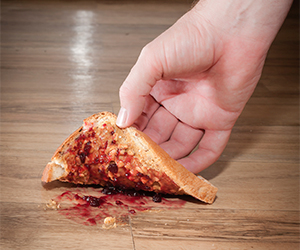
Drop a piece of food and you have 5 seconds to pick it up and have it still be safe to eat. We’ve all heard the 5 Second Rule, and maybe some of us have done it. But it is really safe?
Researchers at Rutgers University took to the lab to find out. The looked at four different foods (watermelon, bread, bread with butter, and gummy candy) and four different surfaces (wood, stainless steel, ceramic tile, and carpet) and four different lengths of time (1 second, 5 seconds, 30 seconds, and 300 seconds). They studied how these foods were contaminated with Enterobacter aerogenes, a bacterial relative of Salmonella, after being dropped on the surfaces for different lengths of time. Each of the 128 different possible combinations were tested and repeated twenty different times, totally 2,560 measurements for comparison.
Their results proved interesting. While the results did show that longer contact times lead to more bacterial contamination, the food itself and the type of surface also significantly affected the results as well. They found that the foods with a higher moisture level had more transfer of bacteria. Contrary to many opinions, carpet had the lowest rate of bacterial transfer. The result of this study showed that the type of food and the surface it falls on may have just as much significance as the time, ultimately disproving the weight of the 5 Second Rule.
What does this mean for you?
Foodborne illness, or illness brought on by eating food contaminated with harmful bacteria, affects roughly 48 million Americans annually, with 128,000 requiring hospitalization, and ultimately killing 3,000 people each year.
Surgery, in general, can weaken the immune system, making it harder for your body to fight infection. Surgical patients, including gastric sleeve, gastric band, and gastric band patients should steer clear of foods that could be full of harmful bacteria, including those that have fallen, are past their expiration date, or otherwise look or smell suspect. Also, taking your prescribed vitamins to prevent nutritional deficiencies can help strengthen your immune system, as can regular exercise and adequate amounts of sleep.
The above is offered by Dr. Shillingford, M.D., P.A., a board certified surgeon specializing in advanced laparoscopic and obesity surgery. Dr. Shillingford’s gastric sleeve, gastric band, and gastric bypass patients come from all over South Florida, including Boca Raton, Wellington, Miami, Parkland, Coral Springs, and West Palm Beach, for his expertise in affordable bariatric surgery. While Dr. Shillingford strives for successful weight loss surgeries free from complications, it is up to each individual to prevent contracting foodborne illness after their weight loss surgery. Avoiding using the 5 Second Rule is an easy way of reducing the risk of foodborne illness.

 Am I A Candidate
Am I A Candidate  BMI Calculator
BMI Calculator  Why Choose Us
Why Choose Us